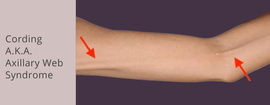
You asked…Jean answered! I am so excited to share this guest blog post from Jean LaMantia, RD. Jean is a registered dietitian who works with lymphedema. As you know, food is a big struggle for me and I know many of you in the My Lymphedema Life Facebook and Instagram groups have asked questions about how nutrition can impact lymphedema. Well, I didn’t have the answers for you, so I connected with an expert who does. If you’re interested in learning more from Jean, check out her website, https://jeanlamantia.com.
1. Does What You Eat Make A Difference For Your Lymphedema?

You can probably answer that question for yourself…have you noticed increases in your lymphedema after something you ate? Most people with lymphedema or their therapist have noticed this at some point and the answer to this question is YES!
Sometimes, you don’t know what has caused your flare-up, but other times, you are able to pinpoint a trigger. As a registered dietitian and creator of Lymphedema Nutrition School, my students have shared the following examples with me about what they identify as triggers:
- Chinese food
- Alcohol
- Not drinking enough water
- Pizza
- Burgers and fries
What do these trigger foods have in common? There are three commonalities that I can see in this list; 1) a high salt content, 2) a high fat content and 3) a low water content/ dehydrating effect, or a combination of all of these. In addition, there may be individual triggers – foods that may bother you, but are not triggers for everyone with lymphedema. Tracking your intake and your lymphedema is one way to help identify these.
2. Is There A Diet For Lymphedema?
I’ve found a nutrition plan that works for my 1:1 clients and students. It includes low salt, low fat and lots of water. In addition, we incorporate an anti-inflammatory diet, with the hopes that this can help delay the progression of lymphedema.
3. How Else Does My Diet Affect My Lymphedema?

In addition to high salt foods – that increase fluid retention and high fat foods – that produce more lymph, foods that improve your microbiota, in theory, could be helpful. Did you know that the largest collection of lymph nodes in the body is in the mesentery – the lining that contains the intestines? Each villi of the intestines contains a single lymphatic capillary called a lacteal and the sprouting of new lacteals is dependent on VEGF-C (vascular endothelial growth factor – C) which is dependent on your microbiota.
Having a healthy population of microbiota can help to ensure a healthy population of lacteals and tight junctions without leaks in your intestines.
4. How Does Time Restricted Eating Help Lymphedema?

Time restricted eating is a type of intermittent fasting that restricts eating to 12 hours or less in a 24 hour period. We all do this now…since we’re not eating 24 hours per day…but time restricted eating, is done in a conscious way to gradually decrease the eating window and increase the fasting window.
A common example would be 16:8 – this means that you would restrict your eating to an eight-hour window such as 10 am until 6 pm and fast for 16 hours – from 6 pm until 10 am the next morning. While there is no research specifically on time restricted eating and lymphedema, we know from other research that time restricted eating is safe. I recommend it with the theory that a minimum 12 hour fast, will allow the GI lymphatics to process the lymphedema fluid that was created after eating. My students report improvements with their weight and their lymphedema when they implement this.
5. How Do I Get Help With My Lymphedema Diet?

The profession that has the proper education and training to provide medical nutrition therapy are registered dietitians (also called registered dietitian-nutritionists), the initials to denote these qualifications are RD or RDN. Working with a dietitian that understands lymphedema and the role of nutrition can greatly benefit your lymphedema and your overall health.
Remember, if changing your diet was easy, you would have done it by now, it’s OK to get help. Diet can help your lymphedema, with or without weight loss. When you’re successful at implementing positive diet changes it’s reassuring to know that you are doing everything you can to manage your lymphedema and slow its progression.
For more information on lymphedema diet, there are several resources that you can access including lymphedema nutrition blogs, book and on-line programs.Save on Solidea Compression Garments

Disclaimer: This blog is for general information purposes only. Furthermore, information contained in this blog is not a substitute for medical advice – always consult a licensed healthcare professional for advice on your specific condition.



